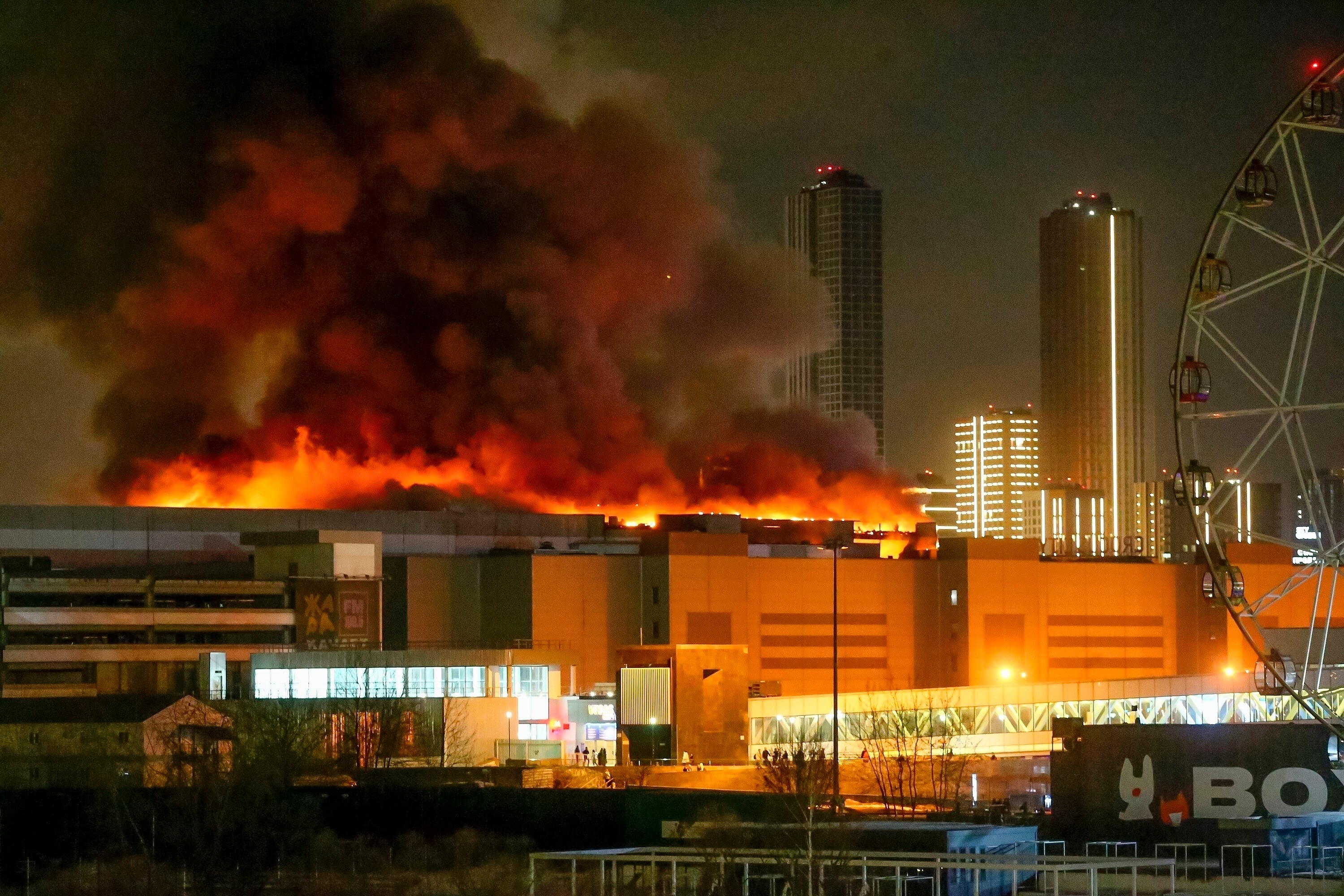The Moscow attack shows the threat from Isis is as high as ever – the West must beware
At a time of combustible geopolitics, with international focus on the wars in Ukraine and Gaza, terrorist groups will seek to take advantage of a frayed security landscape, writes Kim Sengupta


Strong indications that Islamist extremists were planning to carry out an attack – “a spectacular” one in terms of its lethal ambition – had been around for a while. And there was a certain grim inevitability to the massacre of more than 140 people that took place yesterday in Moscow.
Despite relations between Nato and Russia reaching the lowest point since the coldest of times during the Cold War, channels of communication on matters of terrorism have remained active between the Kremlin and a number of Western states.
It is believed that the US, and then the UK, were receiving information at the start of the year that Isis was planning an attack in Russia in the near future, and warnings were passed on to Moscow by the Americans.
Russian intelligence had also been receiving similar reports, and there has also been a pronounced rise in scathing attacks on the Kremlin and Vladimir Putin for “having Muslim blood on their hands” historically in Afghanistan, Chechnya and Syria, but also for killings in Africa’s Sahel by Moscow’s proxy mercenary groups.
Isis is believed to have been responsible for some of the bloodiest recent terror attacks in Russia, including the 2017 bombing of the St Petersburg metro system in which 15 people were killed and 45 injured.
On 3 March this year, Russia’s security service, the FSB, said six Islamist terrorists had been killed in the Ingush Karabulak region. Four days later it announced it had prevented an attack on a synagogue in the Kaluga region near Moscow. “It was established that the militants of an international terrorist organisation are preparing an attack on parishioners using firearms”, said the FSB in a statement.
The same day, the US administration called on Americans to leave Moscow, saying “the embassy is monitoring reports that extremists have imminent plans to target large gatherings in Moscow, to include concerts, and US citizens should be advised to avoid large gatherings over the next 48 hours”.
It is not unusual for the West to pass on information on possible terrorist attacks to adversary states. A warning was sent by Washington to Iran in January before Isis carried out suicide bombings that claimed more than a hundred lives in the city of Kerman in January.
The common link in these attacks is Afghanistan.
The atrocity in Moscow is believed to have been carried out by Isis-K (Islamic State-Khorasan), which was formed in 2015 by Islamist groups who had been in combat with Russians in central Asia and is now entrenched and growing in reach in Taliban-ruled Afghanistan after President Biden’s withdrawal of Western forces from the country in 2021.
Isis-K’s deadly intent was shown even as the chaotic retreat was taking place in a devastating bombing on the edge of Kabul airport, which claimed the lives of 183 people – 170 Afghans and 13 US service personnel.
What has happened should be a warning to the West. There is no reason why having struck inside Russia, Isis-K would not go on to try similar acts in Europe and the US. After all, it was the jihadist international legion created by the West to fight the Russians in Afghanistan that carried out the 9/11 attacks.
We can also expect to see accusations and recriminations about what happened in Moscow spreading. On Saturday President Putin alleged there was Ukrainian complicity in the attack, claiming that the killers were seeking to escape to Ukraine, and comparing what had happened to Nazi barbarity – terms Russian officials have used to describe Ukrainian action since the war started.
Volodymyr Zelensky’s government in Kyiv immediately refuted the claim and denied culpability. Andriy Yusov, an official with Ukrainian military intelligence, pointed out that the killers would have to go through an area where Russia has its heaviest military and security to reach the Ukrainian border.
Ukrainian intelligence services have carried out a series of targeted attacks inside Russia since the war started and may have been responsible for a number of assassinations. They would get nothing but international opprobrium, however, if linked to the mass slaughter of civilians. The Kremlin, so far, has provided no evidence of Ukrainian involvement.
There is, on the other hand, cogent reasons for Isis-K to strike now and take advantage of the mistrust and recriminations in international relations that two major wars, in Ukraine and Gaza, have engendered.
“Groups like Isis are not going to go away. They may lie for a while, but then try to rise again when conditions are suitable”, a British security analyst, Robert Emerson, pointed out. “That is the reality of terrorism and insurgency.”
Join our commenting forum
Join thought-provoking conversations, follow other Independent readers and see their replies
Comments
Bookmark popover
Removed from bookmarks